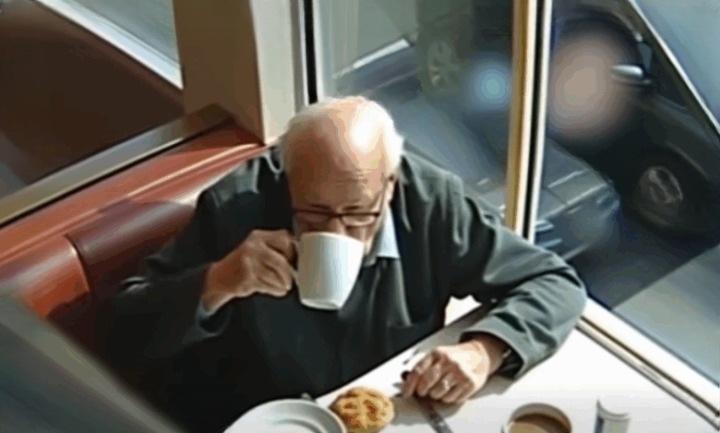For months, I thought the quiet older man who came into Denny’s every Sunday was simply a kind regular with a soft heart for tired servers. He always chose the same booth by the window, ordered black coffee and a Grand Slam, and left a perfect one-hundred-dollar tip every time. No note, no explanation — just a gentle smile and a respectful nod before he slipped out into the parking lot like he belonged to another era.
I used to tell my coworkers he reminded me of one of those mysterious characters from old films — the kind who carried a lifetime of memories but kept them tucked away. I never imagined he had anything to do with me. To me, he was just part of the rhythm of my Sundays: a steady gesture of kindness in the middle of a hectic job.
Then one night, my mom walked into my room holding a worn, slightly faded photograph. She looked uneasy — almost guilty — as she placed it on my desk. I glanced down, and my breath caught. The same man. Younger, but unmistakably him.
“That man… Jess, that’s your grandfather,” she said.
Everything inside me froze. My grandfather? The man who tipped me a hundred dollars every Sunday? The man I’d been calling “sir” like a stranger? I’d grown up thinking I didn’t have a grandfather at all — he was simply never mentioned.
She sat beside me, wringing her hands. “We had a terrible falling-out. He left before you were born. I didn’t know if I’d ever see him again.”
It felt unreal — like something from a movie — but the weight of it hit me hard. All those Sundays… he had known exactly who I was. And instead of approaching me or begging for forgiveness, he chose to show up quietly. One hundred dollars at a time. The only way he thought he could still care for me.
The next Sunday, I was barely functioning. Every time the door chimed, my stomach flipped. My hands shook pouring coffee. I kept wondering what I would say — or whether he would even come.
Then he walked in.
He looked smaller somehow. Older. Fragile in a way I hadn’t noticed before. But when our eyes met, something softened in his — familiarity, warmth, relief.
I didn’t give myself time to overthink. I went straight to his booth.
“Are you my grandfather?” I asked, the word catching in my throat.
He closed his eyes like the truth hurt. When he opened them again, they were filled with tears. “Yes,” he whispered. “I am.”
No speeches. No rehearsed lines. Just raw honesty. And something in his expression — a mix of regret, fear, and hope — washed away my hesitation. I leaned in and hugged him. At first, he didn’t move, like he wasn’t sure I’d allow him that closeness. Then he wrapped his arms around me, gently but full of decades of unspoken emotion.
When he could finally talk, he told me everything.
The fight between him and my parents had been huge — pride, tempers, misunderstandings. By the time he regretted it, he felt too ashamed to come back. So he stayed away. Watched from a distance when he could. He’d known where I worked long before I knew his name. Sundays became his chance to see me, even briefly.
The one-hundred-dollar tips? His apology folded into a generous act. His way of giving something without taking anything from me.
I should’ve been angry — all those lost years, all the silence. But I wasn’t. I saw a man buried under guilt, terrified of doing more harm. A man who had made mistakes, but who tried — quietly, patiently — in the only way he understood.
Soon our Sundays turned into real talks. Not the shallow small talk of strangers, but conversations filled with stories, laughter, awkward pauses, and honesty. He told me things about my mom she’d never shared — childhood antics, road trip memories, the way she used to laugh until she fell over. I introduced him to Peanut, my dog, who eventually became part of our breakfast routine and would curl up in his lap like they’d always known each other.
Eventually, I convinced my mom to join us. She resisted for a long time — old wounds have deep roots. The first visit was stiff and uncomfortable. But little by little, something softened. They talked, argued, and talked again — but this time, it was real. Painful, yes. But healing.
Somewhere between the pancakes and the coffee refills, they began to find their way back to each other.
The $100 tips stopped after that. He didn’t need to leave them anymore. And I didn’t want him to.
What I gained was worth infinitely more — a relationship I never knew I could have, a piece of family history restored, and the reminder that hidden beneath simple kindnesses can be stories far deeper than we imagine.
My grandfather taught me something I’ll never forget: people carry whole worlds inside them — regrets, love, mistakes, hopes — hidden behind ordinary gestures and unfinished conversations.
I don’t know how much time we’ll get together. Life is never predictable. But at least now, we’re not strangers passing in a diner. We’re family, slowly rebuilding something fragile but precious, one Sunday at a time.
And honestly? That means more than every hundred-dollar bill he ever left behind.
